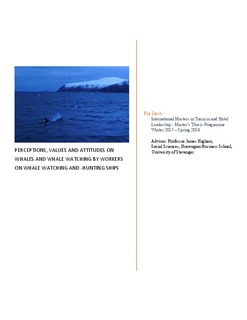| dc.contributor.advisor | Higham, James | |
| dc.contributor.author | Järvi, Pia-Maria Anneli Claudia | |
| dc.coverage.spatial | Northern Norway | nb_NO |
| dc.date.accessioned | 2017-01-05T14:38:03Z | |
| dc.date.available | 2017-01-05T14:38:03Z | |
| dc.date.issued | 2016-07-13 | |
| dc.identifier.uri | http://hdl.handle.net/11250/2426496 | |
| dc.description | Master's thesis in International Hospitality Management | nb_NO |
| dc.description.abstract | Abstract The aim of this study was to gain a better understanding of the views and attitudes of the stakeholder groups whale hunters and whale watching tourism workers, as little research has previously been done in this area. As watching whales in captivity has gained much negative attention worldwide many aquariums have recently been forced to close down, and this is expected to lead to a rapid growth in the area of whale watching tourism.
The research questions were divided into the following main themes: 1) Attitudes towards whales, 2) Is whaling and whale watching mutually exclusive, 3) Information about the whaling industry, and 4) Attitudes towards environmental values. Research was conducted in Northern Norway and Iceland, leading to 19 personal, semi-structured interviews. Data was analyzed using NVivo 11 PRO software, confirming previous research results, but also proving new information: in Norway the whale hunters and whale watching tourism workers had mostly opposing views and feelings about whales and their utilization, but agreed on the importance of nature preservation. The whale hunters further expressed annoyance towards the demands of the tourism industry, but felt the two industries can exist side by side. Tourism workers generally wanted to see whaling stopped. In Norway demands for more control and education were heard within the whale watching industry, and the entire tourism infrastructure was seen as being in need of improvement. In Iceland Finn whaling has come to an end, but Minkie whaling is still done, and people working with whale watching tourism hold strong anti-whaling opinions. Hence, the mutual existence of the two industries is not seen as an option. This is also communicated to tourists in a more direct way than in Norway, e.g. by asking tourists to boycott restaurants that serve whale meat. Future research could be conducted with younger or female whalers / workers in the whale watching tourism industry. KEYWORDS: whaling, whale watching tourism, whale meat, sustainability, profitability, green values. | nb_NO |
| dc.description.sponsorship | Northern InSights | nb_NO |
| dc.publisher | University of Stavanger, Norway | nb_NO |
| dc.rights | Navngivelse 4.0 Internasjonal | * |
| dc.rights.uri | http://creativecommons.org/licenses/by/4.0/deed.no | * |
| dc.subject | reiselivsadministrasjon | nb_NO |
| dc.subject | whale | nb_NO |
| dc.subject | whale watching | nb_NO |
| dc.subject | whale meat | nb_NO |
| dc.subject | whaling | nb_NO |
| dc.subject | sustainability | nb_NO |
| dc.subject | green values | nb_NO |
| dc.subject | co-existence | nb_NO |
| dc.subject | profitability | nb_NO |
| dc.subject | hvalfangst | nb_NO |
| dc.subject | hvalsafari | nb_NO |
| dc.title | Perceptions, values and attitudes on whales and whale watching by workers on whale watching and hunting ships | nb_NO |
| dc.type | Master thesis | nb_NO |
| dc.rights.holder | Pia Järvi / Universitetet i Stavanger | nb_NO |
| dc.subject.nsi | VDP::Samfunnsvitenskap: 200::Økonomi: 210::Bedriftsøkonomi: 213 | nb_NO |

